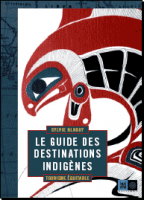Initiatives d’ ecotourisme autochtone dans le monde.
Accueil > Destinations Indigènes > AMERIQUE DU NORD > Canada
Canada

Texte : Pam Wight

Canada is a vast and varied land of many contexts, peoples, and ecosystems. Thus the communities vary greatly, originally reflecting the relationship of the people with the land. And so the nature of CBE also varies. In addition, many aboriginal people in Canada speak their own native languages, making English or French second languages at best, and increasing the difficulties of communication.
In Southern Canada, while there are fewer aboriginal communities, ecotourism may flourish in prairie lands with their many potholes and lakes, where the focus could be on birdlife, waterfowl and migratory species, or agricultural communities may focus on their many rural activities, foods, fairs, and farm vacations.
In the Maritimes, communities have a long history of tourist visitation, and encourage scenic trails, rural festivals, and feature their historic and cultural heritage of the last 2 or 3 centuries. Aboriginal tourism is less pronounced here. West coast communities tend to be further apart, and the focus of CBE might be on the ocean, viewing wildlife, water-related activities, coastal hiking and interpretation, and the food of the sea, as well as on cultural landscapes, aboriginal use of the old growth forests, and their vivid artistic heritage.
In the North and wilderness areas, aboriginal communities abound. They have a land-based economy which means that wildlife viewing and adventure activities are featured with a unique sense of place. However, CBE is hard to achieve due to the distances for visitors to travel, as well as difficulties in communicating and collaborating. These difficulties are even more pronounced in Canada’s Arctic, where the season tends to be short, costs are high, and there are few resources or opportunities for training in visitor expectations. Yet in some of these remote locations, the most distinctive, enjoyable, and unique experiences are had by most visitors.
Despite their challenges, many aboriginal communities regard ecotourism or general tourism as part of a wider quest to achieve economic self-sufficiency as well as socio-political and cultural recognition. They strive to use tourism to preserve their history, values and customs, and to communicate these to visitors, so as to enhance cross-cultural understanding and learning.
Cette rubrique ne contient aucun article.


